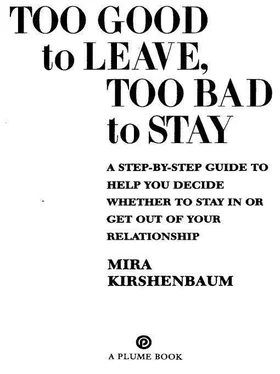Kirshenbaum, Mira - Too Good to Leave, Too Bad to Stay
Здесь есть возможность читать онлайн «Kirshenbaum, Mira - Too Good to Leave, Too Bad to Stay» весь текст электронной книги совершенно бесплатно (целиком полную версию без сокращений). В некоторых случаях можно слушать аудио, скачать через торрент в формате fb2 и присутствует краткое содержание. Жанр: Психология. Описание произведения, (предисловие) а так же отзывы посетителей доступны на портале библиотеки ЛибКат.
- Название:Too Good to Leave, Too Bad to Stay
- Автор:
- Жанр:
- Год:неизвестен
- ISBN:нет данных
- Рейтинг книги:3 / 5. Голосов: 1
-
Избранное:Добавить в избранное
- Отзывы:
-
Ваша оценка:
- 60
- 1
- 2
- 3
- 4
- 5
Too Good to Leave, Too Bad to Stay: краткое содержание, описание и аннотация
Предлагаем к чтению аннотацию, описание, краткое содержание или предисловие (зависит от того, что написал сам автор книги «Too Good to Leave, Too Bad to Stay»). Если вы не нашли необходимую информацию о книге — напишите в комментариях, мы постараемся отыскать её.
Too Good to Leave, Too Bad to Stay — читать онлайн бесплатно полную книгу (весь текст) целиком
Ниже представлен текст книги, разбитый по страницам. Система сохранения места последней прочитанной страницы, позволяет с удобством читать онлайн бесплатно книгу «Too Good to Leave, Too Bad to Stay», без необходимости каждый раз заново искать на чём Вы остановились. Поставьте закладку, и сможете в любой момент перейти на страницу, на которой закончили чтение.
Интервал:
Закладка:
Think about what happens when you’re stuck in relationship ambivalence: every day you give yourself the message that you’re not able to figure out what’s best for you. That’s what destroys self-trust. And where do you go from there? How does a person who can’t trust herself to figure out what’s best for her, figure out what’s best for her?
Let’s go back to Jennifer. Six years of uncertainty had made Jennifer afraid that she actually wasn’t smart enough—a doctor! —to figure out what to do with her relationship. And that’s devastating. You might look at her and feel reassured by seeing how even certifiably smart people can be made to feel stupid in the face of their iffy relationships. But Jennifer became convinced she was stupid when it came to deciding whether to stay or leave, and that damaged her confidence that she could make the right decision.
And because she felt so ambivalent, Jennifer was also afraid she suffered from some grave psychological damage. Why would she be so ambivalent, she wondered, if she wasn’t simultaneously suffering from a fear of intimacy where you’re never happy staying and a fear of abandonment where you’re never able to leave. Like a lot of psychologically sophisticated people, she sifted through events from her childhood, offering them to me as clues for why a decision kept slipping from her grasp. The longer it took her to see the truth about what to do, the more psychologically damaged she thought she must be.
But she was wrong.
From Ambivalence to Self-doubt
I think Jennifer was free of the kind of psychological damage that would leave a person truly unable to choose what to do about a relationship that others would have an easy time deciding about. Sometimes a cigar is just a cigar, most of the time in fact, and sometimes relationship ambivalence is just relationship ambivalence, without any history of deep psychological damage.
“I’m stupid.” “I’m psychologically damaged.” “I’m afraid of being abandoned.” “I don’t know how to handle intimacy.” These are ways in which not knowing what to do about a relationship undermines self-trust. And your undermined self-trust helps keep you stuck.
You’re not the problem. The method you’ve been using is the problem. It’s trying to balance pros and cons that, damages your self-trust. How could you trust yourself when you used a method virtually designed to produce confusion? The diagnostic step-by-step approach we’re using now is designed not only to uncover your truth but to do so in manageable chunks.
The Ambivalence Trap. Let’s look at what losing self-trust does to you. Back when she first met Don, there was a race inside Jennifer between love and doubt, the way there is for all of us in that period before you commit to somebody. Love usually wins, otherwise you wouldn’t make the commitment. But love’s victory doesn’t annihilate doubt. Doubt lurks in the bushes, waiting for you to come back from your honeymoon.
And for Jennifer, as it does for so many of us, doubt crept back in as Don revealed more and more of his shortcomings. At the beginning she’d trusted herself to recognize that love was speaking the truth to her, and now she desperately wanted to trust that she’d known what to do then and knew what to do now.
But she didn’t know what to do now. And the less certain she was, the less she trusted herself. The less she trusted herself, the harder it was to find her way back to certainty.
This is a psychological process called the Ambivalence Trap. The more we try to weigh the mountain of facts and feelings we’ve accumulated, the more confused we get. The more confused we feel, the less we trust ourselves. The less we trust ourselves, the more we feel we have to wait, allowing more confusing evidence to pile up. This is where relationship ambivalence becomes a self-perpetuating trap.
The Way Out. Imagine being thrown into a deep sandy pit with a small shovel. All a shovel can do is dig you in deeper, eroding the very walls you need to climb out. That’s what self-doubt does: it erodes whatever happens to be solid under your feet. To climb out you need a completely different kind of tool, a ladder let down to you that you can use to climb out step by step.
This book is your ladder. Clarity waits for you on the other end. It may be that your self-trust has received many blows, but in fact it’s not really been damaged. You were simply using the wrong tool.
A week after she answered question #1 and realized the truth about her relationship, I saw Jennifer happier than I’d ever seen her. It was clear to her that she wanted to end her relationship with Don, and she felt better about her decision with each passing day. Jennifer has been on her own for four years now, and she’s never regretted her choice for a moment. Whatever alternative turns out to be right for you, I know you’ll feel the same way.
NEXT STEPS
There’s a chance you’ve already found the truth you were looking for if you answered no to question #1 or yes to question #2. You can feel secure with this truth. Nothing’s going to change it. The guidelines here won’t contradict themselves.
But it’s more likely that you’ll find your truth as I keep asking questions and discussing what your answers mean. Some answers, like the ones I’ve talked about so far, will allow me to recommend you get out. But you’ll be happy to know that other answers will allow me to point to important strengths in your relationship you might have overlooked. These strengths permit me to feel comfortable saying there are resources in your relationship that can overcome a number of risk factors.
What if you’ve found your truth already? If this were one of my workshops, I’d make an offer no one ever takes: “If you’re clear already about what’s best for you to do, feel free to go.” And they’re right to stay. Sometimes, even though you see the truth with your mind, you don’t feel it with your heart. Sometimes you feel the truth but you just need confirmation. And you’ll find it as you keep going through the questions and guidelines. So even if you know your truth right now, you’ll benefit by answering all the questions.
Take whatever time you need. I want you to feel confident that, as long as you’re honest with yourself, you’re on a path that’ll lead you to the best, most responsible decision for you.
4
It’s Too Late, Baby
Issue: If You’ve Already Decided to Leave
We’ve all known people who got married and one or two things went wrong and bang they ended the relationship. But there’s a deepening sense that divorce shouldn’t be so easy and automatic. People today just don’t feel comfortable with hair-trigger divorces.
But the other end of the spectrum is growing. I’m talking about people who’ve made it too hard for themselves to leave, not too easy. Instead of a hair-trigger divorce, for these people the bullet’s already left the gun and yet they’re still afraid to pull the trigger. Deep down they’ve already decided to leave the relationship and yet they’re sticking around anyway. If they could admit it, they’d say, it’s too late, baby, to their partner—this relationship’s not been good enough for me to stay in for quite a while, and now it’s over.
These “stuck stayers” are a minority of people in relationship ambivalence, but if you fall into this minority, you deserve help fast because you’re not really ambivalent at all.
There are many reasons for not knowing it’s over when it’s over. You might feel guilty. You might still think you’re in love. You might not be willing to face the post-breakup choices that await you. You might be afraid of freedom. You might be afraid of loss. And you might (this is just as true for women as for men) be having a hard time connecting with the bedrock of how you really feel about the relationship. The next two questions are designed to help you get over these obstacles if deep down you’ve already decided to leave.
Читать дальшеИнтервал:
Закладка:
Похожие книги на «Too Good to Leave, Too Bad to Stay»
Представляем Вашему вниманию похожие книги на «Too Good to Leave, Too Bad to Stay» списком для выбора. Мы отобрали схожую по названию и смыслу литературу в надежде предоставить читателям больше вариантов отыскать новые, интересные, ещё непрочитанные произведения.
Обсуждение, отзывы о книге «Too Good to Leave, Too Bad to Stay» и просто собственные мнения читателей. Оставьте ваши комментарии, напишите, что Вы думаете о произведении, его смысле или главных героях. Укажите что конкретно понравилось, а что нет, и почему Вы так считаете.












